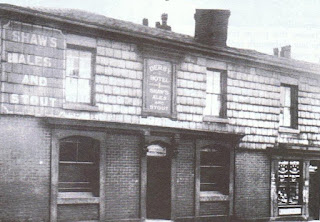Noble Street pictured in August 2015 (copyright Google
Street View). The Methodist church dominates a truncated street that at one
time ran all the way down to Deane Road but which now runs for barely a quarter
of its former length. The Noble Street Tavern stood where the hedges are in the
distance.
Once known as the ‘Hark Up To Glory’ the Noble Street
Tavern dated back to the 1860s. A James Heywood is listed as the landlord of an
un-named, un-numbered pub on Noble Street which is believed to have been the
Noble Street Tavern.
By 1876 the pub was numbered 87 Noble Street and was known
as the Noble Street Tavern. It was owned by Robert Grime. By then the Noble
Street Independent Methodist church had opened nearby in 1872. For the four
years prior to moving into its rather grand premises it had existed on
Blackburn Street (later known as Deane Road) as a mission of the Folds Road
Methodist church. A small street named Temperance Street separated the pub from
the church’s Sunday school building.
The Noble Street Tavern was taken over by Robert Wood
of the Prince Arthur brewery on St John Street in the 1880s.
By 1906, the pub stood directly opposite the church’s
Sunday School building with the church next door. Only a narrow thoroughfare
named Temperance Street separating pub from church. Temperance Street and Noble
Street Independent Methodist church still stand. The Noble Street Tavern had
its licence refused in 1906. It was converted into a residential property
before being demolished with much of the rest of Noble Street in the 1960s.
The site of the pub is now the Jehovah’s Witness
church car park. Temperance Street and the Noble Street Independent Methodist
church still exist.



